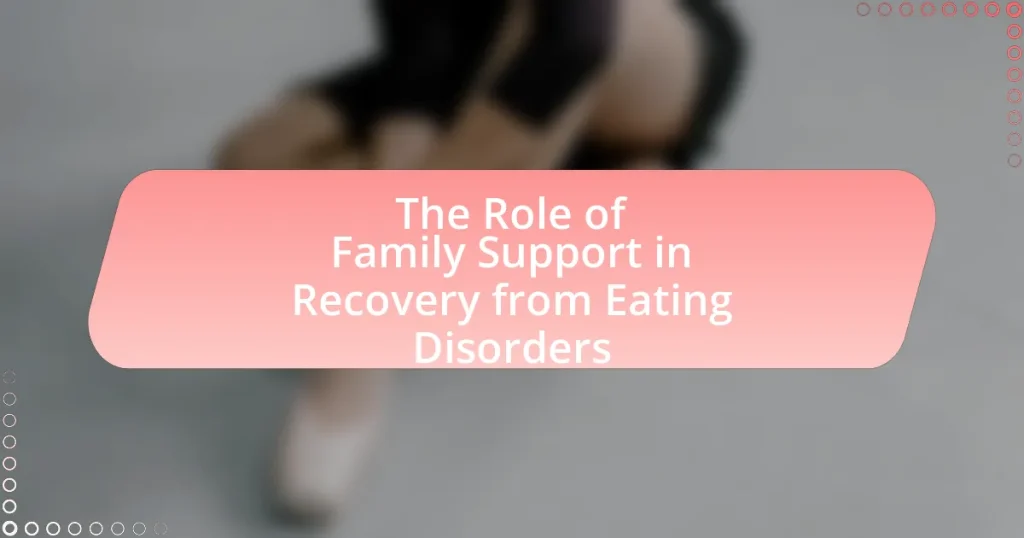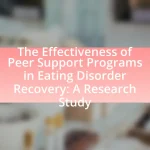Family support is a critical component in the recovery process from eating disorders, providing emotional, psychological, and practical assistance that significantly enhances treatment outcomes. Research indicates that individuals with strong family support systems experience lower relapse rates and improved adherence to treatment plans. The article explores various aspects of family support, including emotional and practical support, the impact of family dynamics on recovery, and the importance of family involvement in therapy. Additionally, it addresses the challenges families face, common misconceptions about eating disorders, and effective communication strategies to foster a supportive environment for recovery.
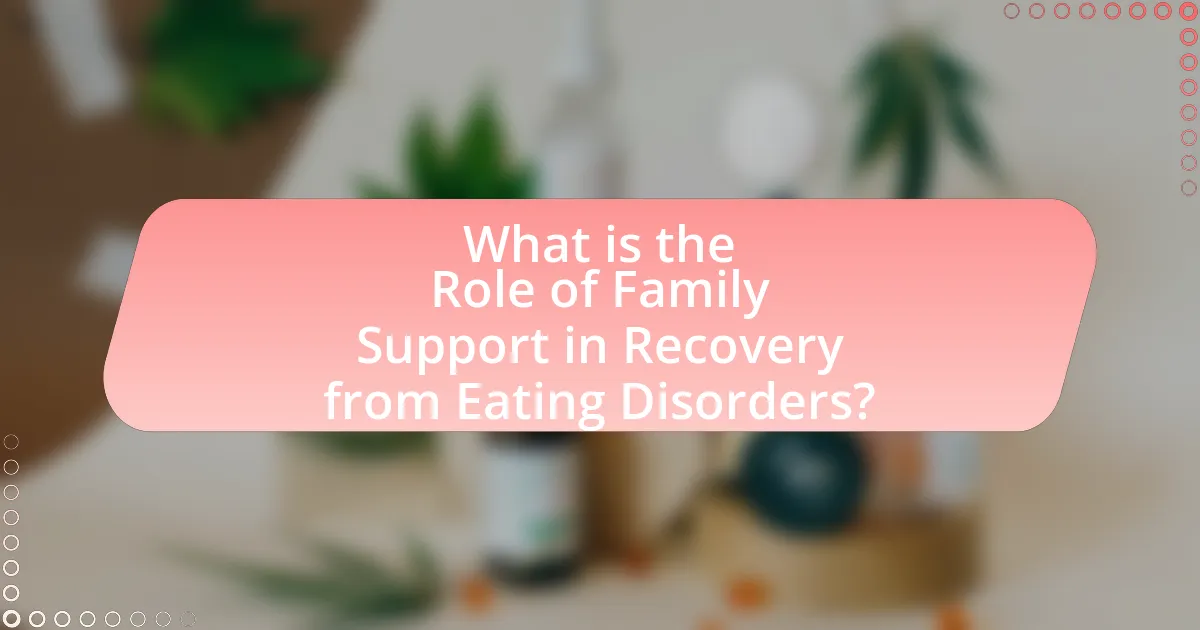
What is the Role of Family Support in Recovery from Eating Disorders?
Family support plays a crucial role in the recovery from eating disorders by providing emotional, psychological, and practical assistance. Research indicates that individuals with strong family support systems are more likely to engage in treatment and experience positive recovery outcomes. For instance, a study published in the Journal of Eating Disorders found that family involvement in therapy significantly improved treatment adherence and reduced relapse rates. Furthermore, supportive family environments foster open communication, which can help individuals express their struggles and feelings related to their eating disorders, ultimately facilitating healing and recovery.
How does family support influence the recovery process?
Family support significantly enhances the recovery process from eating disorders by providing emotional stability, practical assistance, and motivation. Research indicates that individuals with strong family support systems experience lower rates of relapse and improved treatment outcomes. For instance, a study published in the Journal of Eating Disorders found that patients who engaged their families in therapy reported higher levels of recovery and satisfaction with their treatment. This support fosters a sense of belonging and accountability, which are crucial for overcoming the challenges associated with eating disorders.
What specific aspects of family support are most beneficial?
Emotional support is the most beneficial aspect of family support in recovery from eating disorders. This type of support includes understanding, empathy, and validation of feelings, which can significantly enhance an individual’s self-esteem and motivation to recover. Research indicates that individuals who receive emotional support from family members are more likely to engage in treatment and experience positive outcomes. For instance, a study published in the Journal of Eating Disorders found that family involvement in therapy led to improved recovery rates and reduced relapse among patients. Additionally, practical support, such as assistance with meal preparation and attending therapy sessions, also plays a crucial role in fostering a supportive environment conducive to recovery.
How does the presence of family support affect treatment outcomes?
The presence of family support significantly improves treatment outcomes for individuals recovering from eating disorders. Research indicates that strong family involvement can lead to higher rates of treatment adherence, reduced relapse rates, and improved psychological well-being. For instance, a study published in the Journal of Eating Disorders found that patients with supportive family dynamics experienced better recovery trajectories and were more likely to achieve sustained remission compared to those with less family involvement. This correlation underscores the critical role that family support plays in enhancing the effectiveness of treatment interventions for eating disorders.
Why is family involvement crucial in the recovery journey?
Family involvement is crucial in the recovery journey from eating disorders because it provides essential emotional support and fosters a positive environment for healing. Research indicates that family dynamics significantly influence treatment outcomes; for instance, a study published in the Journal of Eating Disorders found that patients with strong family support showed higher rates of recovery and lower relapse rates. Additionally, family members can help monitor behaviors, encourage adherence to treatment plans, and facilitate open communication, which are all vital for successful recovery.
What psychological benefits does family support provide?
Family support provides significant psychological benefits, including enhanced emotional well-being, reduced feelings of isolation, and increased resilience during recovery from eating disorders. Research indicates that individuals with strong family support systems experience lower levels of anxiety and depression, which are common in those struggling with eating disorders. A study published in the Journal of Family Psychology found that supportive family dynamics contribute to improved self-esteem and coping strategies, facilitating a more effective recovery process. Furthermore, family involvement in treatment has been shown to lead to better adherence to therapeutic interventions, ultimately resulting in more favorable outcomes for individuals facing these challenges.
How can family dynamics impact an individual’s recovery?
Family dynamics significantly impact an individual’s recovery from eating disorders by influencing emotional support, communication patterns, and overall family environment. Positive family dynamics, characterized by open communication and emotional support, can enhance an individual’s motivation and resilience during recovery. Conversely, negative family dynamics, such as conflict, lack of support, or enabling behaviors, can hinder recovery efforts and exacerbate the individual’s struggles. Research indicates that families who engage in supportive behaviors and foster a nurturing environment contribute to better recovery outcomes, as seen in studies highlighting the correlation between family involvement and reduced relapse rates in individuals recovering from eating disorders.
What challenges do families face when supporting a loved one with an eating disorder?
Families face significant challenges when supporting a loved one with an eating disorder, including emotional distress, communication difficulties, and the need for education about the disorder. Emotional distress arises from witnessing a loved one’s suffering, leading to feelings of helplessness and anxiety. Communication difficulties often stem from the loved one’s reluctance to discuss their condition, which can create misunderstandings and strain relationships. Additionally, families frequently lack knowledge about eating disorders, making it hard to provide effective support and navigate treatment options. Research indicates that family involvement is crucial for recovery, yet the emotional toll and lack of resources can hinder their ability to assist effectively.
What common misconceptions about eating disorders can hinder family support?
Common misconceptions about eating disorders that can hinder family support include the belief that eating disorders are solely about food and weight, the assumption that individuals with eating disorders can simply choose to stop their behaviors, and the idea that these disorders only affect young women. These misconceptions prevent families from understanding the complex psychological and emotional factors involved in eating disorders, which can lead to inadequate support. Research indicates that eating disorders are multifaceted mental health conditions, often linked to underlying issues such as trauma, anxiety, and depression, rather than just dietary habits. Additionally, the notion that recovery is a straightforward process can lead families to become frustrated or disengaged when faced with the challenges of treatment. Understanding these misconceptions is crucial for families to provide effective support during recovery.
How can families effectively communicate with their loved ones during recovery?
Families can effectively communicate with their loved ones during recovery by fostering an open and supportive dialogue. This involves actively listening to the loved one’s feelings and concerns without judgment, which helps create a safe space for expression. Research indicates that supportive communication can significantly enhance recovery outcomes; for instance, a study published in the Journal of Eating Disorders found that families who engage in empathetic conversations contribute positively to the emotional well-being of individuals recovering from eating disorders. Additionally, using “I” statements to express feelings and avoiding blame can further strengthen the communication process, ensuring that the loved one feels understood and valued.
How can families best support their loved ones in recovery?
Families can best support their loved ones in recovery by fostering open communication and creating a safe environment. Open communication allows individuals to express their feelings and challenges, which is crucial for emotional support. A safe environment encourages honesty and reduces the fear of judgment, enabling the loved one to share their struggles without hesitation. Research indicates that family involvement significantly enhances recovery outcomes, as families who actively participate in treatment processes can help reinforce positive behaviors and coping strategies. For instance, a study published in the Journal of Eating Disorders found that families who engage in therapy alongside their loved ones contribute to lower relapse rates and improved emotional well-being.
What strategies can families implement to foster a supportive environment?
Families can implement open communication, active listening, and unconditional support to foster a supportive environment. Open communication allows family members to express their feelings and concerns without fear of judgment, which is crucial in addressing issues related to eating disorders. Active listening ensures that each member feels heard and validated, promoting emotional safety. Unconditional support reinforces the idea that family members are valued regardless of their struggles, which can significantly enhance recovery outcomes. Research indicates that families who engage in these strategies create a nurturing atmosphere that is essential for effective recovery from eating disorders, as highlighted in studies by the National Eating Disorders Association.
How can families educate themselves about eating disorders to provide better support?
Families can educate themselves about eating disorders by accessing reliable resources, attending workshops, and engaging with healthcare professionals. Utilizing reputable organizations such as the National Eating Disorders Association (NEDA) provides families with comprehensive information on symptoms, treatment options, and recovery processes. Research indicates that informed families can significantly enhance the recovery environment, as studies show that family involvement in treatment leads to better outcomes for individuals with eating disorders. Additionally, participating in support groups allows families to share experiences and learn from others facing similar challenges, further strengthening their ability to provide effective support.
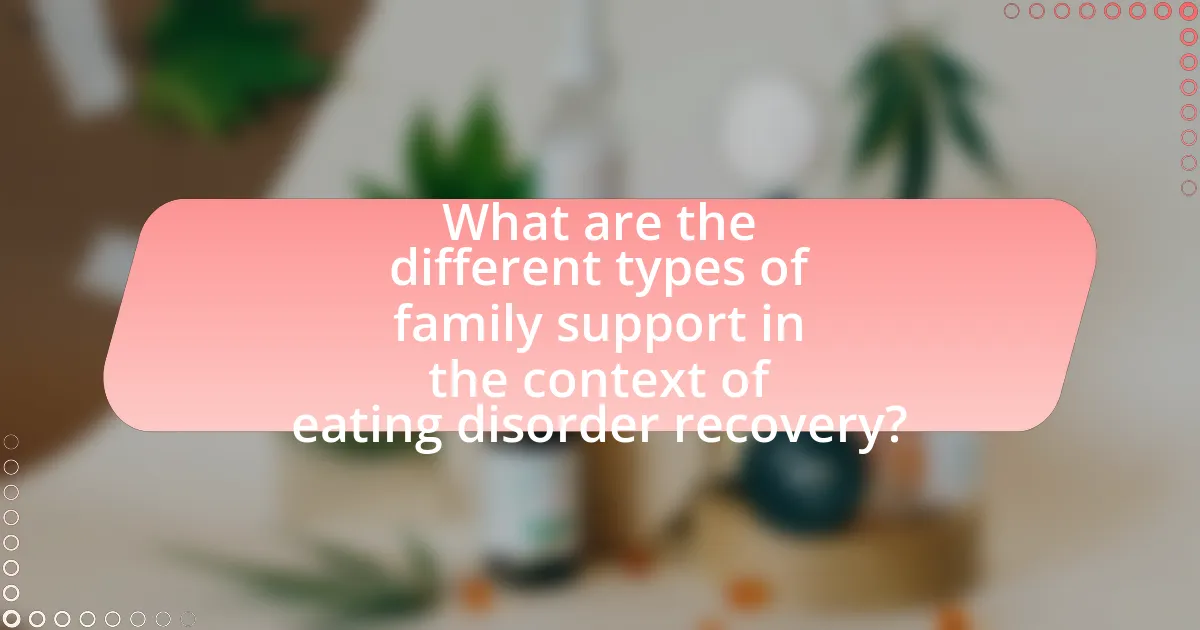
What are the different types of family support in the context of eating disorder recovery?
Different types of family support in the context of eating disorder recovery include emotional support, practical support, and informational support. Emotional support involves family members providing understanding, empathy, and encouragement, which can significantly enhance the individual’s motivation to recover. Practical support encompasses assistance with daily tasks, meal preparation, and attending therapy sessions, which helps reduce the burden on the individual. Informational support consists of family members educating themselves about eating disorders and recovery processes, enabling them to offer relevant advice and resources. Research indicates that strong family involvement can lead to better recovery outcomes, highlighting the importance of these support types in the recovery journey.
How do emotional and practical support differ in their impact?
Emotional support and practical support differ significantly in their impact on individuals recovering from eating disorders. Emotional support, characterized by empathy, understanding, and validation, fosters a sense of belonging and reduces feelings of isolation, which is crucial for mental health recovery. Research indicates that individuals who receive strong emotional support are more likely to engage in treatment and experience improved psychological well-being. In contrast, practical support involves tangible assistance, such as help with meal preparation or attending therapy sessions, which directly addresses the logistical challenges of recovery. Studies show that practical support can enhance adherence to treatment plans and improve outcomes by alleviating stressors related to daily living. Thus, while emotional support nurtures psychological resilience, practical support facilitates the logistical aspects of recovery, both playing essential but distinct roles in the healing process.
What role does emotional support play in the recovery process?
Emotional support plays a crucial role in the recovery process from eating disorders by providing individuals with a sense of belonging, validation, and encouragement. This support helps to reduce feelings of isolation and anxiety, which are common in those struggling with such disorders. Research indicates that individuals who receive emotional support from family and friends are more likely to adhere to treatment plans and experience improved mental health outcomes. For instance, a study published in the Journal of Eating Disorders found that strong family support significantly correlates with better recovery rates and lower relapse rates among individuals with eating disorders.
How can practical support assist in daily recovery efforts?
Practical support assists in daily recovery efforts by providing tangible help that addresses specific needs, such as meal preparation, transportation to therapy sessions, and assistance with daily tasks. This type of support can reduce stress and anxiety, allowing individuals to focus on their recovery process. Research indicates that practical support from family members significantly enhances adherence to treatment plans and improves overall recovery outcomes in individuals with eating disorders. For example, a study published in the Journal of Eating Disorders found that individuals who received consistent practical support from family reported higher levels of motivation and engagement in their recovery efforts.
What role does family therapy play in recovery from eating disorders?
Family therapy plays a crucial role in the recovery from eating disorders by addressing the familial dynamics that contribute to the disorder. Research indicates that involving family members in treatment can enhance communication, improve relationships, and provide a supportive environment for the individual. For instance, studies have shown that family-based therapy, particularly the Maudsley approach, has a success rate of over 80% in adolescents with anorexia nervosa, highlighting its effectiveness in fostering recovery. By engaging families in the therapeutic process, family therapy helps to create a collaborative support system that is essential for long-term recovery from eating disorders.
How does family therapy differ from individual therapy?
Family therapy differs from individual therapy primarily in its focus on the dynamics and relationships within a family unit rather than solely on the individual. In family therapy, multiple family members participate in sessions to address issues collectively, aiming to improve communication and resolve conflicts that may contribute to an individual’s eating disorder. Research indicates that involving family members can enhance treatment outcomes, as family dynamics often play a significant role in the development and maintenance of eating disorders. For instance, a study published in the Journal of Family Psychology found that family-based interventions significantly improved recovery rates in adolescents with anorexia nervosa compared to individual therapy alone.
What are the goals of family therapy in the context of eating disorders?
The goals of family therapy in the context of eating disorders include improving communication among family members, fostering a supportive environment for the individual with the disorder, and addressing family dynamics that may contribute to the eating disorder. Family therapy aims to enhance understanding of the disorder within the family, promote healthy coping strategies, and encourage collective involvement in the recovery process. Research indicates that involving family members can lead to better treatment outcomes, as families play a crucial role in the support system necessary for recovery.
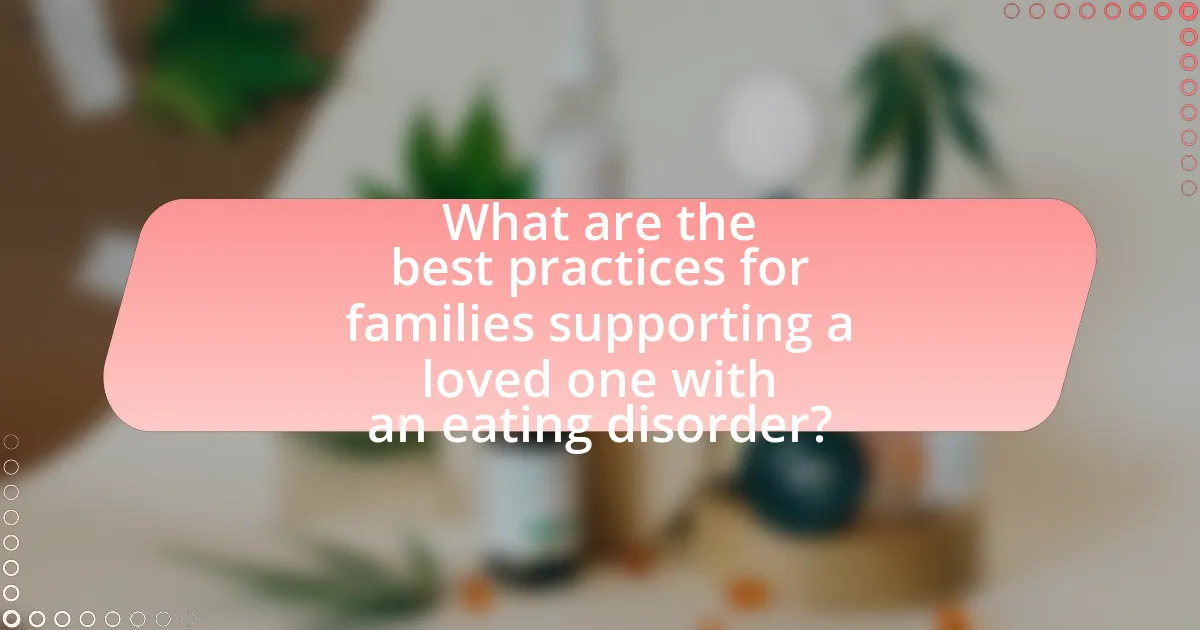
What are the best practices for families supporting a loved one with an eating disorder?
Families supporting a loved one with an eating disorder should prioritize open communication, empathy, and education about the disorder. Open communication fosters a safe environment where the individual feels comfortable expressing their feelings and struggles. Empathy allows family members to understand the emotional and psychological challenges faced by their loved one, which can reduce feelings of isolation. Education about eating disorders equips families with the knowledge to recognize symptoms, understand treatment options, and avoid triggering behaviors. Research indicates that family involvement in treatment can significantly improve recovery outcomes, as families who are informed and supportive can help reinforce positive behaviors and coping strategies.
How can families create a positive recovery environment?
Families can create a positive recovery environment by fostering open communication, providing emotional support, and promoting healthy behaviors. Open communication allows family members to express feelings and concerns, which can reduce feelings of isolation often experienced by individuals recovering from eating disorders. Emotional support, such as showing empathy and understanding, helps build trust and encourages the individual to engage in their recovery process. Additionally, promoting healthy behaviors, such as preparing nutritious meals together and participating in physical activities as a family, reinforces positive lifestyle choices. Research indicates that family involvement significantly enhances recovery outcomes, as families that actively support their loved ones contribute to lower relapse rates and improved mental health (Le Grange et al., 2016, Journal of Eating Disorders).
What communication techniques can enhance family support?
Effective communication techniques that can enhance family support include active listening, open-ended questioning, and expressing empathy. Active listening involves fully concentrating on what the family member is saying, which fosters a sense of validation and understanding. Open-ended questions encourage deeper conversations, allowing family members to express their feelings and thoughts more freely, thus promoting a supportive environment. Expressing empathy helps family members feel understood and cared for, which is crucial in the context of recovery from eating disorders. Research indicates that families who engage in these communication techniques can significantly improve the emotional well-being of individuals facing such challenges, as they create a safe space for sharing and healing.
How can families set healthy boundaries while providing support?
Families can set healthy boundaries while providing support by clearly communicating expectations and limits regarding behaviors and responsibilities. Establishing open dialogue allows family members to express their needs and concerns, which fosters a supportive environment. Research indicates that families who engage in structured communication and set defined boundaries contribute positively to the recovery process for individuals with eating disorders, as it helps to reduce enmeshment and promotes individual autonomy. For example, a study published in the Journal of Family Psychology found that families with clear boundaries experienced better outcomes in treatment adherence and emotional well-being.
What resources are available for families seeking to support their loved ones?
Families seeking to support their loved ones with eating disorders can access various resources, including support groups, educational materials, and professional counseling services. Support groups, such as the National Eating Disorders Association (NEDA) Family Support Group, provide a platform for families to share experiences and gain insights from others facing similar challenges. Educational materials, available through organizations like the Academy for Eating Disorders, offer information on understanding eating disorders and effective communication strategies. Professional counseling services, including family therapy, can help families navigate the complexities of recovery and improve relational dynamics. These resources collectively empower families to provide informed and compassionate support to their loved ones.
What types of support groups exist for families of individuals with eating disorders?
Support groups for families of individuals with eating disorders include peer-led groups, professional-led groups, and online support communities. Peer-led groups, such as those organized by the National Eating Disorders Association (NEDA), provide a space for family members to share experiences and coping strategies. Professional-led groups often involve therapists or counselors who guide discussions and offer expert advice, helping families understand the complexities of eating disorders. Online support communities, like those found on platforms such as Facebook or dedicated forums, allow families to connect and support each other regardless of geographical barriers. These various types of support groups are essential for fostering understanding, reducing isolation, and promoting effective coping mechanisms among families affected by eating disorders.
How can families access educational materials on eating disorders?
Families can access educational materials on eating disorders through various reputable sources, including organizations such as the National Eating Disorders Association (NEDA) and the Academy for Eating Disorders (AED). These organizations provide comprehensive resources, including articles, guides, and webinars specifically designed for families seeking to understand eating disorders and support their loved ones. For instance, NEDA offers a Family Toolkit that includes information on how to communicate effectively with individuals struggling with eating disorders, as well as strategies for providing support. Additionally, many local hospitals and mental health clinics offer workshops and informational sessions for families, further enhancing their understanding and ability to assist in recovery.
What practical tips can families implement to aid in recovery?
Families can aid in recovery from eating disorders by fostering open communication and creating a supportive environment. Encouraging regular family meals can help normalize eating patterns and reduce anxiety around food. Additionally, families should educate themselves about eating disorders to better understand the challenges their loved one faces, which can enhance empathy and support. Establishing routines that include physical activity, without focusing on weight loss, can promote a healthy relationship with exercise. Lastly, seeking professional guidance, such as family therapy, can provide structured support and strategies tailored to the family’s unique dynamics. These approaches are supported by research indicating that family involvement significantly improves treatment outcomes for individuals with eating disorders.
